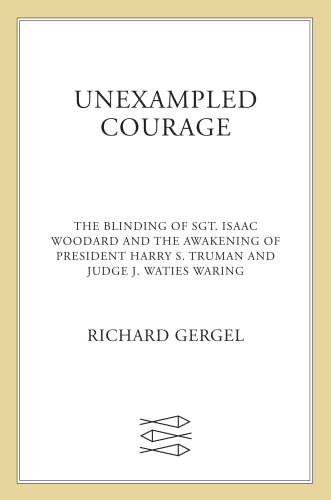
Unexampled Courage
The Blinding of Sgt. Isaac Woodard and the Awakening of President Harry S. Truman and Judge J. Waties Waring
کتاب های مرتبط
- اطلاعات
- نقد و بررسی
- دیدگاه کاربران
نقد و بررسی

September 15, 2018
A federal judge from South Carolina examines a rarely mentioned 1946 race-based crime that profoundly altered officially sanctioned segregation of blacks in the white-dominated United States.Gergel (In the Pursuit of the Tree of Life: A History of the Early Jews of Columbia, South Carolina, 1996) drew inspiration from a courageous predecessor judge who presided in the Charleston federal courthouse. However, the searing narrative does not open with the heroic judge, J. Waties Waring (1880-1968). Rather, the author opens in 1945, as roughly 900,000 black soldiers returned to the U.S. after serving their country in World War II. One of them, Isaac Woodard (1919-1992), was on a bus in rural South Carolina, planning to return to his family. The white bus driver perceived that Woodard, dressed in his military uniform, was acting disrespectfully, so he halted the bus and ejected him, handing him over to the racist local police chief, Lynwood Shull. Although unprovoked, Shull beat Woodard with a blackjack, with special force around his eyes. The wounds caused almost immediate blindness, and Woodard lay helpless in the local jail. Eventually, news of the beating reached civil rights activists, who made sure President Harry Truman heard about the brutality. That set in motion legal proceedings culminating in charges that were shocking at the time. At Truman's insistence, federal prosecutors filed criminal charges against Shull. The case unfolded in the courtroom of Judge Waring, and an all-white jury quickly acquitted Shull. However, the obviously unjust verdict shook Waring to his emotional core, and he spent the remainder of his career writing rulings meant to promote fairness for blacks in his courtroom, working remotely with such allies as the NAACP and Thurgood Marshall. President Truman reacted to the beating of Woodard by ordering racial integration of the U.S. military despite massive resistance. Gergel is both an astute researcher and an engaging writer, bringing this significant story to vivid life.Civil rights history at its most compelling.
COPYRIGHT(2018) Kirkus Reviews, ALL RIGHTS RESERVED.

Starred review from November 5, 2018
In this enlightening study, judge and historian Gergel illuminates the far-reaching effects of an individual act of cruelty. Gergel lays out the terrible racial logic that led from decorated WWII veteran Isaac Woodard’s innocuous request that the driver of his Greyhound bus allow him a rest stop to him permanently losing his eyesight after South Carolina police chief Lynwood Shull assaulted him with a blackjack in 1946. When NAACP leader Walter White brought Woodard’s case to President Truman’s attention, the latter, aware that this was far from an isolated instance of racist violence, responded: “We have got to do something.” Truman created the first presidential committee on civil rights, whose investigations led, by 1948, to the desegregation of the nation’s armed forces, a crucial precedent to the reforms of the next two decades. Meanwhile, in South Carolina, an all-white jury acquitted Shull; this outcome so appalled the presiding judge, Waties Waring, that he became a civil rights crusader in the heart of the former Confederacy. Gergel’s prose is workmanlike, and he narrates this story in greater detail than some readers may desire, but this is an important work on the prehistory of the civil rights struggle and an insightful account of how a single incident can inspire massive social and political changes. Agent: Lisa Adams, Garamond Agency.

When returning home from his tour in World War II, Sgt. Isaac Woodard was brutally beaten and blinded by the police chief of Batesburg, SC, for allegedly not showing the due respect to a white bus driver by an African American in the Jim Crow South. Gergel, a U.S. District Judge in South Carolina and coauthor of Pursuit of the Tree of Life, offers a fascinating historical and legal investigation of this event and how it ignited the postwar civil rights movement. The Woodard incident shocked President Harry Truman and Judge J. Waties Waring, both of whom, along with Woodard, displayed "the unexampled courage," says Gergel, essential to ensuring African Americans their constitutional rights. Truman, constrained by powerful Southern legislators, used his appointment power and executive orders to desegregate the armed forces and to create the President's Committee on Civil Rights. Waring evolved from a judicial gradualist into a civil rights advocate, whose opinions became the leading arguments for the 1954 Brown v. Board of Education Supreme Court decision that outlawed school segregation. VERDICT Gergel reintroduces oft-forgotten civil rights heroes in this captivating, deeply researched work that is likely to draw in general readers, historians, and legal scholars alike.--Karl Helicher, formerly with Upper Merion Twp. Lib., King of Prussia, PA
Copyright 1 Library Journal, LLC Used with permission.
December 15, 2018
On February 12, 1946, Sergeant Isaac Woodard, a decorated African American veteran, was returning to his South Carolina home on a Greyhound bus following his discharge from army service. After a seemingly minor dispute with the bus driver over a bathroom stop, the unruly Woodard was removed from the bus and beaten by the local police chief. This was an unexceptional event in the Jim Crow South. After several days, however, it became apparent that the severity of the blows had permanently blinded Woodard. This sparked national outrage. Consequently, President Truman established a commission on civil rights, and the Justice Department filed criminal charges against the police chief (who was acquitted by an all-white jury). In 1948, Truman desegregated the U.S. armed forces. Both the African American press and the NAACP were energized to intensify efforts to keep civil rights issues and violence against blacks before the public eye. Gergel presents a compelling account of a case that helped point the way for broader, more intense, and more effective efforts in the civil rights movement.(Reprinted with permission of Booklist, copyright 2018, American Library Association.)

























دیدگاه کاربران